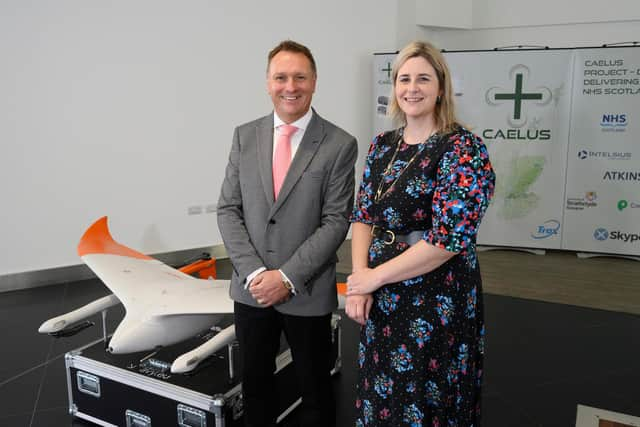Drone test flights carrying NHS medical supplies to start in Glasgow next year
Tests are due to begin early next year between the Queen Elizabeth University Hospital in Glasgow and the Golden Jubilee University National Hospital in Clydebank in the next stage of the CAELUS project (Care And Equity – Healthcare Logistics Unmanned aircraft system Scotland) led by Glasgow Airport owner AGS.
Three other trial routes after the initial six-mile link are due to follow, including to remote areas.
Advertisement
Hide AdAdvertisement
Hide AdUK Research and Innovation, which is funding the project, said the first regular flights to rural areas could start the following year.
Challenge director for future flight Gary Cutts said: "It’s entirely feasible to have a low rate of a real operating network by the summer of 2024.”
Drones which can carry medicines, and blood and other samples, are predicted to cut delivery times by more than two-thirds compared to road and ferry journeys, along with as-yet unquantified cost savings.
They could enable more patients to be treated at home rather than have to make regular lengthy journeys to faraway hospitals, and also improve patients’ survival rates.
However, remaining challenges include ensuring drones and other aircraft do not come into conflict, such as low-flying military exercises.


The potential new use for drones follows existing operations such as in inspecting railways, pipelines and power lines, while the Royal Mail is planning drone postal routes in Orkney.
CAELUS project director Fiona Smith said an initial medical drone network would take supplies to and from GP surgeries rather than direct to patients’ homes
Public health minister Maree Todd said it was “absolutely critical” to harness such technological innovations to help the NHS’s recovery from the Covid pandemic.
Advertisement
Hide AdAdvertisement
Hide AdShe also told an event at Glasgow Airport on Tuesday to mark the next stage of the project that drones could help create an “equity of care” between urban and remote areas, where 26 per cent of Scotland’s population live.
She said: “They have the potential to completely revolutionise the way health services are delivered in Scotland.”
NHS Grampian innovation programme lead Hazel Dempsey, said: "Our aim is to test the use of drone technology in urban, remote, rural and island landscapes.
"We want to test if using drones to will improve important aspects of our logistics service, for example, to test the transportation of laboratory samples, blood products, chemotherapy and medicine delivery.
"Ultimately, we want to explore if drone technology can speed up diagnosis and treatment of medical problems.”
Tharaka Kothalawala, the Future Flight Challenge for air traffic control firm Nats, said: “We’ll be developing the concepts for how airspace could be managed, and the procedures required to safely integrate a network of multiple drones with existing flight operations, and then putting those concepts to the test in a live trial with our consortium partners."
The project originated with a concept by the University of Strathclyde, with £10.1 million funding for its latest stage announced last month by UK Research and Innovation as part of its Future Flight Challenge to develop new types of aviation.
Drone firm Skyports will operate the trial flights after being involved in separate tests with NHS Scotland.
Comments
Want to join the conversation? Please or to comment on this article.
